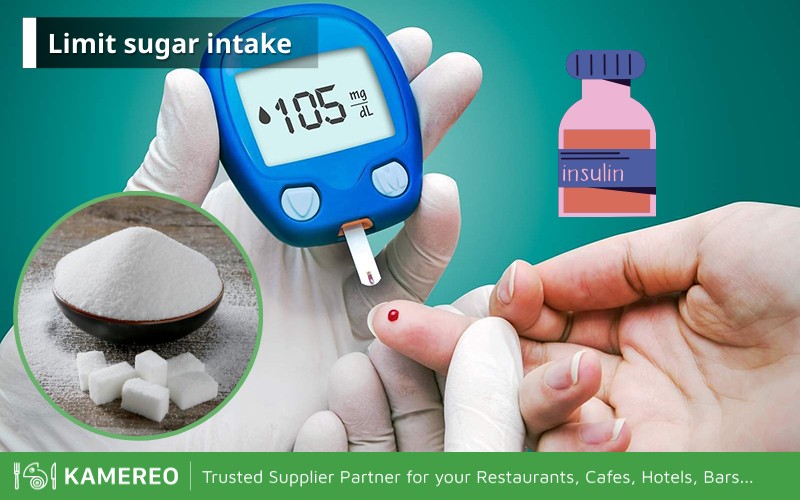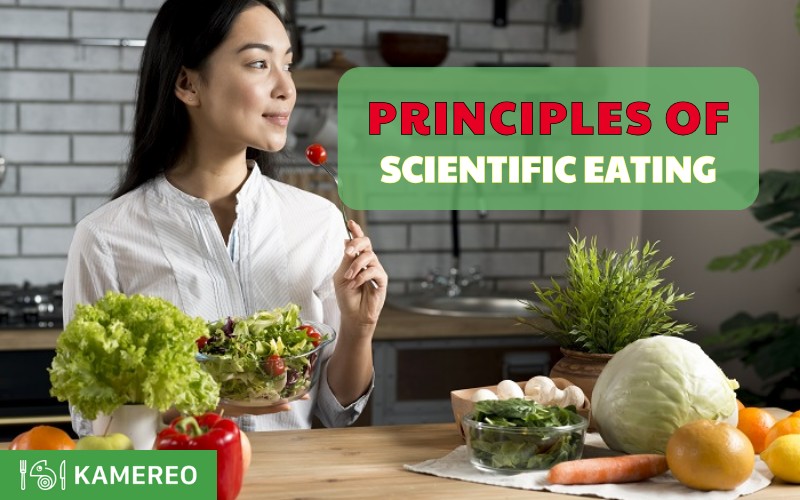Scientific eating habits not only help maintain a healthy body but also aid in preventing and dealing with various diseases. However, adhering to this diet can be challenging at first, and not everyone understands it well enough to apply it. In today’s article, Kamereo will share the basic principles of scientific eating to protect health.

Table of Contents
The role of a scientific diet
Establishing and maintaining a scientific diet will bring significant benefits to the body, such as:
- Reducing the risk of diseases: Eating a well-balanced diet with proper nutrition and following food hygiene principles helps strengthen the immune system, aiding the body in resisting bacteria and viruses that cause diseases.
- No need for supplements: When providing sufficient nutrients from natural foods, there’s no need to use supplements or functional foods.
- Supporting digestion: Eating clean, supplementing with plenty of fruits and vegetables helps improve digestive health. Additionally, it prevents constipation and maintains a healthy digestive system.
- Good for body shape and skin: Combining a healthy diet with regular exercise helps maintain an ideal body shape and have healthy, beautiful skin.

Principles of scientific eating, good for health
While understanding the importance of a scientific diet, do you know what it means to eat scientifically for good health? Here are the dietary guidelines recommended by nutrition experts.
Supplementing necessary nutrients
Regardless of age, gender, health status, occupation, or hobbies, adhering to the principles of a scientific diet according to nutritional needs is crucial. This ensures the body receives enough energy and essential nutrients, promoting efficient daily functioning and development.

Supplementing all nutrient groups
A meal is considered nutritionally complete when it includes foods from the four main nutrient groups:
- Carbohydrates: The main source of energy for the body, including foods like rice, corn, potatoes, wheat, etc.
- Proteins: Derived from animal sources like meat, fish, eggs, or plant sources like legumes, beans, grains, etc.
- Fats: Including animal fats or vegetable oils.
- Vitamins and minerals: Supplied from fruits, green vegetables, and various tubers.

Additionally, ensure you have three main meals and can supplement with 1 to 2 snacks depending on your body’s needs. Do not skip breakfast and avoid overeating at dinner to maintain the best health.
Limit salt intake
This dietary principle applies to all age groups, from children to adults, especially the elderly. While salt is an essential component in cuisine, it should be used in moderation.
On average, each adult needs about 6 – 8g of salt per day. Therefore, excessive salt consumption may increase the risk of cardiovascular and blood pressure-related diseases.
For young children, reducing salt in their diet is crucial because their organs, especially the kidneys, are still developing. Consuming too much salt can affect the function of these organs and lead to unhealthy eating habits in the future. For children under 1 year old, there is no need to add salt to their solid food. Children from 1 – 2 years old only need a minimal amount of salt, ranging from 0.3 – 2.3g/day.

Moreover, you should avoid foods such as pickles, fish sauce, shrimp sauce, meat sauce, dried fish, dried chicken, dried squid, and canned products. These foods often contain high amounts of salt and preservatives, which are not good for health.
Limit sugar intake
Sugar is an essential source of energy for the body and supports the efficient digestion and metabolism of food. However, excessive sugar consumption can lead to various health issues.
In mild cases, consuming too much sugar can reduce the body’s immune function. In more severe cases, it can lead to obesity, diabetes, heart disease, etc. That is why limiting sugar intake is essential to maintaining a healthy body and reducing the risk of diseases.

Control fat intake
Similar to sugar, fat plays a crucial role in the body’s energy metabolism. However, fat intake needs to be controlled and should only be consumed in moderate amounts. Nutrition experts recommend that adults consume around 600g of fat per month.
To ensure adherence to the principles of scientific eating while still getting enough nutrients, you should consume fats in moderation. Specifically, prioritize using plant-based fats in your daily diet and limit the consumption of fats from animal sources. Doing so will help the body avoid health issues such as obesity, heart disease, high blood pressure, etc.

Eat plenty of fresh vegetables, fruits
A basic principle of a scientific diet is to supplement plenty of vegetables, fruits, and tubers in your daily menu. These foods contain various vitamins, minerals, and fiber, beneficial for digestion, detoxification, and effective waste removal. Especially, green leafy vegetables, yellow fruits, and tubers containing beta-carotene have anti-cancer effects and help prevent diseases.

Drink enough water every day
Water provides many valuable health benefits, including improving mental alertness, enhancing blood flow, preventing urinary stones, preventing constipation, and keeping the skin moisturized. Therefore, you need to ensure you drink from 1.5 to 2 liters of water per day. This helps the body stay healthy and full of energy.

Note: You should divide the water intake into several time intervals throughout the day. Avoid drinking too much water at once to prevent pressure on the kidneys.
Ensure food safety and hygiene
An important principle of scientific eating is ensuring the safety and hygiene of food. Dirty or improperly processed and stored foods can pose risks of poisoning and other dangerous diseases. Therefore, only use fresh, high-quality food with a clear origin, and pay attention to the cooking and storage process.
Additionally, always maintain the habit of washing your hands before preparing food and before eating. This helps eliminate bacteria that may be present on your hands and prevents bacteria from entering the body through food.
Read more: 10 Golden Principles in Safe Food Processing You Should Know

Avoid smoking and limit alcohol consumption
Finally, stay away from harmful stimulants such as cigarettes, alcohol, and beer. At the same time, dedicate at least 30 minutes each day to exercise and sports. This way, you will maintain good health, a cheerful spirit, and reduce the risk of diseases.

Read more: Beer Consumption: Exploring the Pros and Cons for Your Health
With the information we shared above, we hope readers will have a better understanding of the principles of eating for good health and can apply them for themselves and their families. This will help people possess a healthy body and ward off the risk of diseases. Additionally, follow the Health and Beauty section for more useful information!




